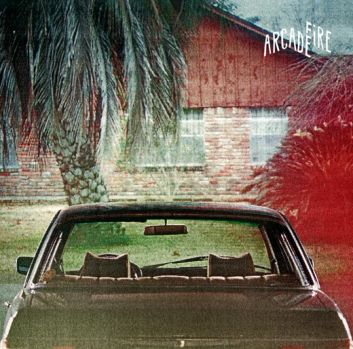The first thing you notice listening to The Suburbs, the wildly anticipated third album from indie superstars Arcade Fire, is how deceiving the length is. A 16-song album in 2010 has “Big Serious Artistic Statement” written all over it, but The Suburbs doesn’t seem especially self-impressed or ponderous. Part of this is probably because Win Butler, Régine Chassagne, and the rest of the band have already spent two highly-acclaimed albums, 2004’s classic Funeral and 2007’s politically-charged Neon Bible, making grand statements on a smaller scale. The first time I saw them in concert, I thought they were going to be the next U2. I still think that, but not for all of the same reasons. The stadium-grade bombast is dialed back a bit, but more than either of Arcade Fire’s two previous albums, The Suburbs has in common with U2’s best work the fact that its lyrics were written about a very specific experience but could very easily be applied to anything depending on each listener’s own personal background.
There’s no shortage of the group’s usual flag-waving stadium rock—“Ready to Start” is going to kill as a tour opener, and “We Used to Wait” is as uplifting as anything they’ve ever written—but this time around, they are balanced out by hushed, pensive ballads, most notably “Half-Life I.” As usual, Arcade Fire are at their best in tension-building moments: the few seconds leading up to the orchestral explosion in “Rococo,” the transition between the two halves of standout cut “Suburban War,” and the way “Modern Man” fakes you out, acting like it’s going to build into some “My Body is a Cage” theatrics before falling right back into the song’s previous slow burn.
The Suburbs is also Butler’s most on-the-surface universal set of lyrics to date. Despite its songs being relentlessly anthemic, Funeral’s subject matter was deeply personal, its sentiments not really intended to be shared by the outside world. Its uneven follow-up, Neon Bible, took the opposite tack, teeing off on religion, the government, and basically every other outside force in the world. Thankfully, The Suburbs retreads none of this ground, with Butler opting instead to create an album-length portrait of an upbringing in a community without an identity. If Neon Bible found him pushing out the outside world entirely, then here he invites everyone in to share his existential pain.
Usually, when people refer to an album as a “grower,” it’s code for “well, I didn’t like it the first time I heard it, but now I think it’s not completely terrible.” The Suburbs, however, is a grower in the best possible sense. It sounds great the first time you listen to it, and continues to sound great—often for different reasons—the second, third, and thirtieth time through. For every immediate anthem—“We Used to Wait” or the ABBA-meets-Depeche Mode synth-pop of “Sprawl II (Mountains Beyond Mountains)”—there are two or three about which you’ll notice different things with each spin. The first time you hear “City With No Children,” for example, you might think about how badass the guitar riff is (and it’s certainly the most memorable one since “Wake Up), but after a while with it you’ll start to think about it as a sobering look at Butler’s own younger, more idealistic self: “Do you really think your righteousness can pay the interest on your debt?/ I have my doubts about it.”
At 16 tracks and just over an hour, The Suburbs is the Montreal collective’s longest release to date, and for people who are quick to throw around words like “overindulgent” or “self-absorbed,” this is going to be an immediate red flag. But to write off The Suburbs for this reason alone would be an enormous mistake, because Arcade Fire have crafted something truly remarkable here.


